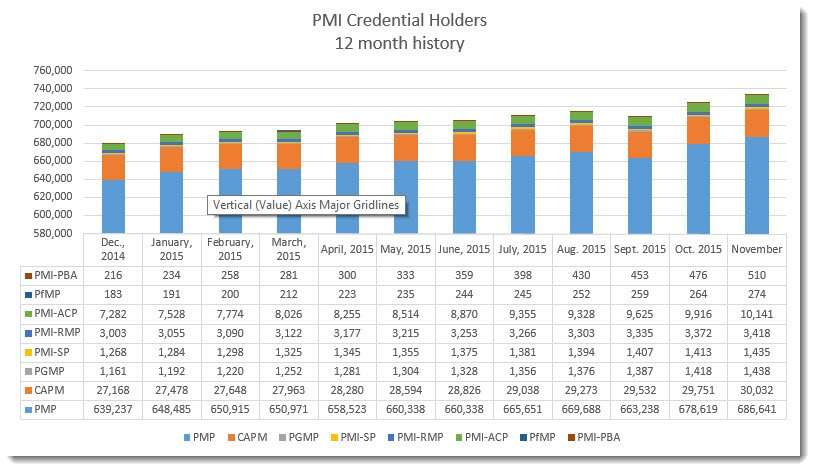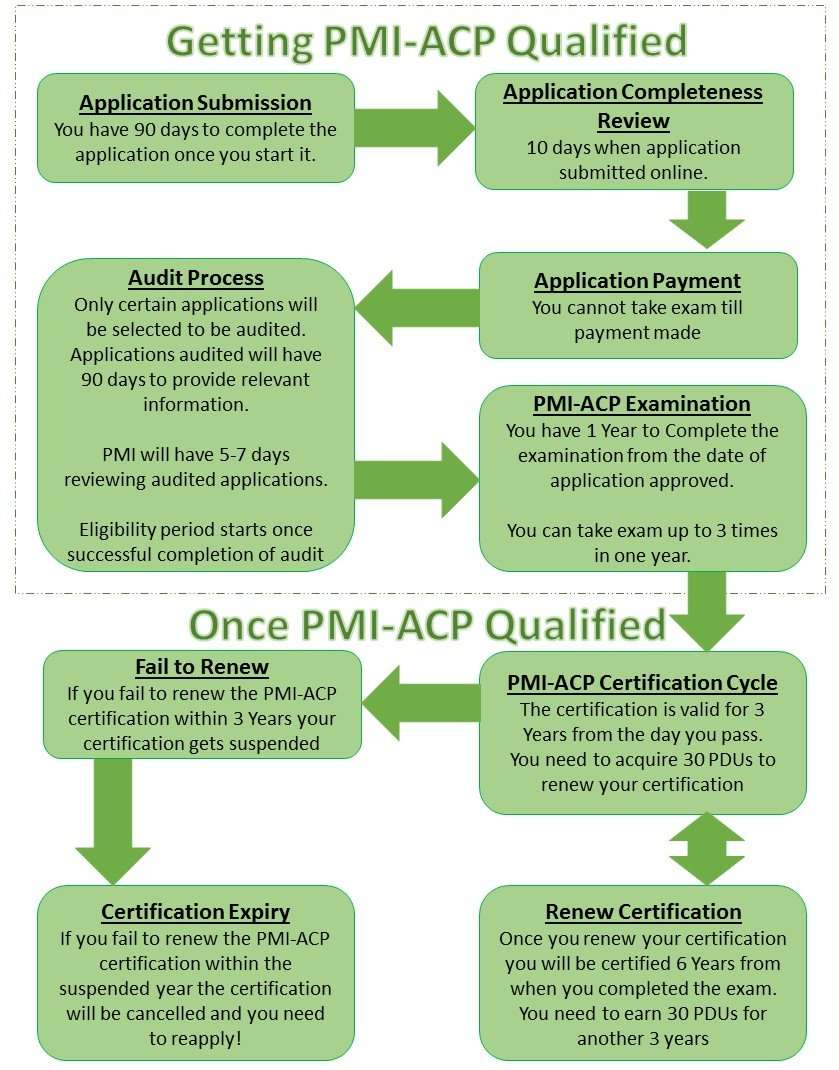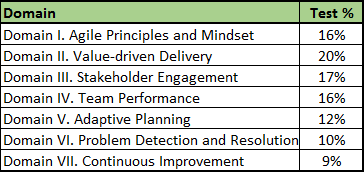From studying Agile methodologies in college and completing the Scrum master certification I can confidently state that PMI-ACP® is currently the best Agile Certification on the market at the moment.
The PMI Agile Certified Practitioner (PMI-ACP)® formally recognises your knowledge of agile principles and your skill with agile techniques. The PMI-ACP® training certificate is the PMI® equivalent to the PMP® but for Agile projects instead of traditional projects. The PMI-ACP® is the PMI® reaction to the increase in Agile projects over the past few years.

More About Me
I completed the PMP® in December 2015 and the PMI-ACP® in April 2016. One thing that you should be aware is that PMI-ACP® exam is completely different to the PMP®. It is nearly all situational questions but if you approach it using the process of elimination it makes it easier. The PMI-ACP® exam is examining your understanding of the “Agile Mindset”, where PMP® exams the methodology for managing traditional projects.
I personally found the PMI-ACP® course content more relevant to the workplace but that is mainly down to the industry I work in (Software development, IT Systems). If I was to recommend one certificate to someone it would be the PMI-ACP® as it cover’s everything Agile which can help people approach their everyday work in an Agile way. Previous certificates I completed such as Scrum Master are good if you are working in just Scrum projects/organizations and want to be a Scrum Master, PMI-ACP® covers everything Agile from methodologies like Scrum, XP to Agile mindset and principles. You can find out more about me here.

PMI-ACP® Application Process
If you work on agile teams or if your organization is adopting agile practices, the PMI-ACP® is a good choice for you. First, before you can start studying for the exam you need to make sure you meet the requirements. I highly recommend you download the latest PMI-ACP® handbook which has all information you will need to apply.
Requirements
- 21 contact hours of education
- 2,000 hours of general project experience working on teams. A current PMP® or PgMP®will satisfy this requirement but is not required.
- 1,500 hours working on agile project teams or with agile methodologies. This requirement is in addition to the 2,000 hours of general project experience.
PMI-ACP Cost
- Member US$435
- Non-member US$495
Submission
Once you meet the requirements you need to write up the project work you completed verifying the requirements are met. You will be expected to provide two things when submitting your application:
- 1000 Word Description
- Contact Details of Manager
Audit
The PMI® audit is something you should be aware of but not something to be afraid of. Once you provide PMI® sufficient details in the terminology they expect you should have no problem with the application. If you are randomly selected for audit you will need to get a manager in the organization at the time to sign the application page verifying the information you provided on a project. I created a post for the PMP® audit with a list of tips and tricks I used when submitting my applications and never got audited either time.
PMI-ACP® Training Lifecycle


Course Content
The PMI-ACP® exam is divided up as outlined in the below table. You can find official PMI-ACP® content outline in this PMI® pdf document.

Our PMI-ACP® Learning Material
We have created two very detailed documents to help you study for the PMI-ACP® which we highly recommend you check out.
- Our definite Agile Toolkit covering all the recommended tools in official PMI-ACP® content outline.
- The top 175 Agile Skills & Knowledge Checklist
Agile Mindset
As mentioned already the exam is trying to gauge your understanding of the Agile mindset. To get a good understanding of the Agile mindset you should know the Agile principles and Agile manifesto. You can find the original manifesto and principles here http://agilemanifesto.org/
Agile Methodologies
It is essential to know all of the main Agile methodologies (1-4) for the exam.
Other Chapters
We highly recommend purchasing by PMI-ACP Exam Prep, Premier Edition by Mike Griffiths one of the authors of the Agile Manifesto. For comprehensive notes on the PMI-ACP® course content it is well worth checking out Edward Chungs website.
My personal strategy for passing the PMI-ACP® training was very similar to my approach to passing the PMP® exam. The approach is based on 3 things:
- Having a textbook that has been written to primarily help you pass the exam. Originally for the PMP® I purchased the PMBOK® guide which is what the exam is based on but doesn’t help you pass the exam at all.
- Taking sample exams and studying any topics I got wrong or wasn’t 100% on.
- Having an exam day strategy. For the PMI-ACP® you have 3 hours to complete the exam and you should use this time wisely.
PMI-ACP Exam Prep, Premier Edition by Mike Griffiths
The textbook I used as my primary study material was PMI-ACP Exam Prep, Second Edition by Mike Griffiths. I found this book really insightful and easy to follow. There was a few things I really liked about the book:
- The chapters correspond the PMI-ACP® exam format.
- Each chapter has 20 questions ie.120 total sample questions.
- There are tasks throughout the book reiterating material.
- For people interested to learn more they provide extra information but make it clear it won’t be asked on the exam.
PMI-ACP Training with Practice Exams
I took the following sample exams to test my Agile knowledge. One thing you should be 100% aware all of these sample exams are NOTHING LIKE THE REAL EXAM. The actual PMI-ACP® exam asks roughly 90% situational questions as the below will test your Agile knowledge but won’t be put in a situational context.
I created my own PMI-ACP® Exam Prep Practice Exam you can take here.
PMI-ACP Exam Prep, Premier Edition Book:
103/140 Questions – Really good questions and helped identify weak areas. Took it a second time the night before the exam to help recap.
LeadAnswers
16/20 Questions – Not bad questions but far too short to get a real benefit from the questions.
http://leadinganswers.typepad.com/leading_answers/2012/05/pmi-acp-sample-questions.html
FastTrack Demo
18/20 Questions – Not bad questions but far too short to get a real benefit from the questions.
http://shop.rmcls.com/support/ACP/index.aspx
PMIACP4U Blog
95/120 Questions – Answers were underneath the questions which was very frustrating and also questions were mixed up in the middle of the quiz.
http://pmiacp4u.blogspot.hk/2013/09/free-pmi-acp-exam-dumps-120-quest.html
Zenbridge
45/92 Questions – I rushed these questions but wasn’t overly impressed with the questions. There are 3 exams totaling to 92 questions.
- PMI_ACP Question 30/60
- Agile Values & Principles 15/20
free-exam
PMI-ACP® Exam Day Strategy
I arrived 20 minutes before my scheduled time, took 5 minutes to fill in information and get searched before I was seated in the Prometric Center. I brought with me a drink and a snack which was accessible for when I wanted to take a break. My approach was the following:
08:45am – Started the introduction course where I wrote out my notes. I wrote out each methodology values and principles, the Agile manifesto and 12 principles, team formation and correlation with leadership, Maslows hierarchy of needs. I used the Agile manifesto and 12 principles once or twice during the exam but this did help me approach begin the exam feeling prepared and ready to start.
09:00am – Aim to answer 60 questions in the first hour. Also I marked for review any question I wasn’t 100% on.
10:00am – Take a toilet break.
10:05am – Aim to answer remaining 60 questions.
11:05am – Take snack break.
11:10am – Review all questions marked under review.
12:00am – Click finish and get you’re results.

Maintaining PMI-ACP
The PMI® require you to to earn 30 professional development units (PDUs) within 3 years to maintain you’re PMI-ACP® certificate. More information on the PMI® CCR check out the below resources:
Best of luck with the exam, any questions just ask below in the comments section 🙂


